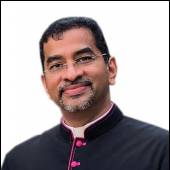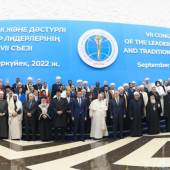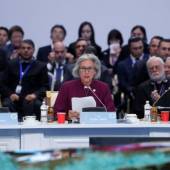Bishop Sierra elected as first president of Catholic Bishops’ Conference of Central Asia

The Catholic Bishops’ Conference of Central Asia (CBCCA) has elected its first president during its plenary meeting in Nursultan, Kazakhstan, April 26-29.
The 52-year-old Bishop José Luis Mumbiela Sierra of the Diocese of the Santissima Trinità (Holy Trinity) in Almaty will head the newly created prelates’ body in the region. He is also the first bishop of the diocese erected in 2003.
Besides, Msgr. Jerzy Maculewicz, Apostolic Administrator of Uzbekistan, and Msgr. Evgeny Zinkovsky, Auxiliary Bishop of the Diocese of Karaganda are elected as vice president and general secretary respectively.
During their four-year term, the new officials and the members of CBCCA will chart out various pastoral programs, initiatives for evangelization and social development works.
Bishops and delegates from Kazakhstan, Kyrgyzstan, Tajikistan, Turkmenistan and Uzbekistan, Mongolia, and Afghanistan attended the meeting, besides other church leaders from the Vatican and South Korea and some government officials from Kazakhstan.
Among others who participated on the first day of the plenary included the President of the Senate of the Parliament of the Republic of Kazakhstan, Ashimbaev Maulen Sagatkhanuly, and the Minister of Information and Social Development of the Republic of Kazakhstan, Umarov Askar Kuanyshevich.
Speaking at the opening function on April 26, Cardinal Luis Antonio Gokim Tagle, prefect of the Congregation for the Evangelization of Peoples, stressed the importance of evangelization in Central Asia, where Christians are a minority, and the contribution of the Church to society.
With a decree issued by the Congregation for the Evangelization of Peoples on September 8, 2021, the new body was officially established to promote missionary work and collegiality among the bishops and representatives of the mission territories.
Cardinal Tagle delineated major areas of focus to be undertaken by CBCCA including “the development of friendly relations with other religions, especially Muslim-Christian dialogue, the training of priests, nuns and laity who carry out catechesis in parishes.”
CBCCA would also undertake the translation and publication of Catholic and prayer books and manuals in national languages to "contribute to the spread of the Gospel in various sectors of society, to the synodal process, to work with young people and families and the implementation of Caritas projects.”
The genesis of the church in the region began with the Apostolic Administration of Kazakhstan and Central Asia, set up in 1991 with its base in Karaganda.
In the same year, the five Central Asian countries—Kazakhstan, Uzbekistan, Kyrgyzstan, Turkmenistan and Tajikistan became independent from the former Soviet Union.
The Apostolic Administration based in Kazakhstan included Kyrgyzstan, Tajikistan, Uzbekistan and Turkmenistan, besides. Kazakhstan
Many of the countries have faced insurmountable persecution and survived atheism, the main problem for Christians in the Soviet era.
The remnants of the Soviet regime can be seen in several former Soviet prison camps that were used to punish dissidents, including those who defied Communist authorities by professing Christianity.
When Pope John Paul II visited independent Kazakhstan in September 2001, one of the clarions calls given by the late Holy Father was to promote and strengthen bonds of Christian-Muslim dialogue and pastoral plan for the Church in Central Asia.
Pope Francis is scheduled to visit the former Soviet republic in Central Asia in September for the 7th Congress of Leaders of World and Traditional Religions.
CBCCA is the youngest member of the Federation of Asian Bishops’ Conferences (FABC).
Radio Veritas Asia (RVA), a media platform of the Catholic Church, aims to share Christ. RVA started in 1969 as a continental Catholic radio station to serve Asian countries in their respective local language, thus earning the tag “the Voice of Asian Christianity.” Responding to the emerging context, RVA embraced media platforms to connect with the global Asian audience via its 21 language websites and various social media platforms.














